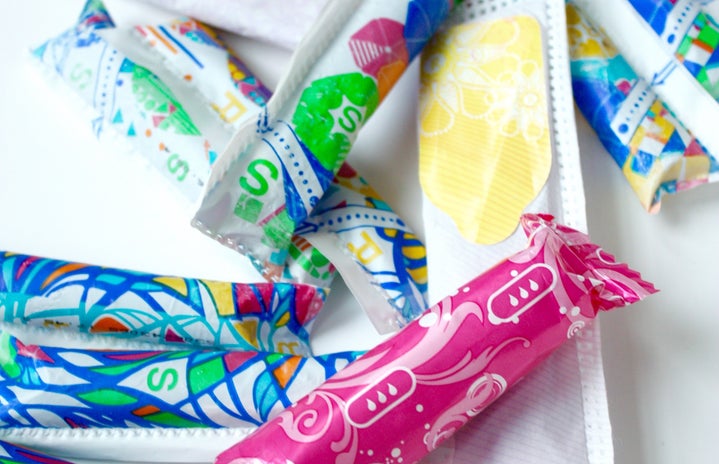Periods are not a luxury. They can be painful, sticky, awkward and embarrassing. People who have periods spend an average of five days a month in pain; often having to use painkillers, take time off work and spend copious amounts of money on period products.
Yet the products we need – tampons, pads, paracetamol, fresh underwear after your surprise period ruined your last one – are seen as luxuries. The average person spends £8 a month on period supplies, which totals almost £100 a year. That’s money that some people don’t have.
This is why the Scottish government’s decision to make period products free to all who need them is such an incredible victory for everyone who menstruates.
So…what is this new bill?
The ‘Period Products (Free Provision) (Scotland) Bill’ will see the country as the first in the world to bring such a regulation into force, stating that period products should be “available for free to people who need them”.
The bill was introduced by MSP Monica Lennon, whose aim was to tackle ‘period poverty’. The Scottish Parliament website outlines how “she sees these products as a basic necessity, and believes that providing access to them is important for people’s dignity”.
The Scottish government’s nation-wide scheme will enforce a range of free period products in schools, colleges and university toilets, and will have the power to make other public places provide them for free.
The country had already begun to make period products more accessible by providing them for free in places of education and providing a £0.5m grant to a charity, FareShare, who deliver free products to low-income households. The bill will protect these in law.
Why is period poverty such a big issue?
Period poverty is an issue that is too often pushed onto other nations, a problem that doesn’t reach our fair isle. Yet, 40 per cent of girls in the UK used toilet roll because they could not afford menstrual products. In 2017, Leeds-based Freedom4Girls found that girls missed school on a monthly basis because of their periods and used toilet roll, tissues and socks sellotaped to underwear instead of sanitary products because they were too embarrassed or couldn’t afford them.
Ending period poverty is not just about being given a tampon every now and then – it’s an issue of dignity. Of being confident that each month, your period will be provided for discreetly, affordably and without stigma.
The products we need every month are still taxed, with the VAT set at 5% by the Labour government in 2001. While some companies, such as Tesco, have dropped the price of period products to shoulder the tax costs for customers, the reality is that these products should not be taxed at all.
The cost of sanitary products is not something that every person can foot, with the average cost being £8 a month. By providing anyone who needs them with free products, the Scottish government has offered a helping hand to those experiencing financial hardship.
Let’s talk about periods.
In the UK, people who menstruate are in classrooms, lecture theatres, boardrooms, leading meetings and serving customers. Yet, there is still a pervading sense of shame that surrounds periods that is so much bigger than simply affording the products. The British stiff upper lip is deployed and people are expected to march on with a silent army of tampons and paracetamol.
A YouGov study found that 3.5 million people in the UK missed school and work due to periods, yet only 27 per cent were honest about why they were absent. Another study of 1,000 schoolgirls found that nearly half were embarrassed by their periods and were afraid to ask for help because of the stigma and shame surrounding menstruation. Periods have been hushed up and blushed at for too long.
That’s why it’s so important that the issue was discussed at all in parliament. The topic on menstruation on the floor of a government has broken down walls of silence that have pervaded in official settings for too long.
The initial document put forward by Monica Lennon noted that before the members had debated the topic of period poverty in September 2016, the only other mention of ‘tampons’ in the Scottish Parliament chamber, “according to the Official Report, was a 2004 debate in which they were part of a list of sewage-related debris found on beaches”.
Perhaps the very nature of this bill and the positive reception it had in the Scottish Parliament, wherein the bill passed unanimously, is a sign of a more inclusive government – one which is reducing the stigma surrounding those who have periods. Because how do you make progress in terms of period poverty if no one will talk about periods?
What can we do to continue this good work?
Scotland should be proud of this new bill; it is a huge step forward in ending period poverty and ensuring that everyone who menstruates are provided for. It’s time for other countries to follow suit.
Until that happens, there are some ways that we can continue to help those who experience period poverty.
You can donate period products to your local food banks and charities that provide sanitary items to people who cannot access them, particularly in England and Wales where bills like the one in Scotland do not exist. If you can, donate money to these charities that are doing great work both in the UK and abroad.
Of course, it doesn’t need to be just financial, the best thing we can do to end the stigma surrounding periods is to talk. Talk to young people who are new to it, talk to other people who menstruate about the struggles you face and the barriers that having periods creates. Talk about how the other UK governments should follow Scotland’s lead. Talk about period poverty. Talk about ending it.
Words By: Emma Jacob
Edited By: Ellis Idris



